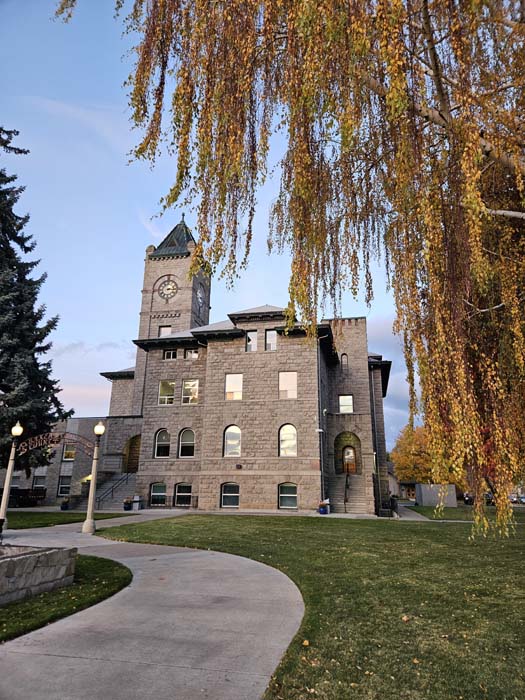A school in the country
Published 11:47 am Saturday, October 1, 2011

- <p>Second graders Stacey Stahl, Elana Stahl and Karolyn Stahl crouch behind their desk while doing a number exercise on video.</p>
They sit in almost complete silence, eyes glued to their computer screens or notebooks, working their way through a Christian distance education program.
With the girls in long dresses and kerchiefs, the boys in suspenders, the 16-student Hutterite school east of Stanfield is a far cry from the colorful, bustling public school in town.
But despite the computers, modern farming and high-tech gadgets some of the men carry smart phones Hutterites are preserving a lifestyle that dates to the 16th century. Faith and tradition are their guiding lights, not personal ambition.
With education, what you want to do is instill in them a love of God first, a love for their fellow man and a love for country, said Hank Stahl, the school principal.
Hutterite children are not encouraged to attend college after they earn a high school diploma, yet education is central to their culture. Hutterites have long been known for their progressive approach to education; they began kindergarten before any other culture, according to a Montana Office of Public Instruction study. The Stanfield colony school has three state-licensed teachers, non-Hutterites, who shepherd the students through their lessons each day.
There is much more one-on-one time, a lot of time to really understand each student, said David Wattenburger, who teaches grades six through eleven with his wife, Tricia. Parent support here is great.
Cathlene Stahl, 17, is soon to earn a state diploma and looking forward to entering a vocation that will assist the rest of the colony, not a career. She loves working with young children, so she might become a preschool or kindergarten teacher, she said. As for the other subjects she enjoys, such as math, physics and history, she said, I do want to learn more, but on my own time.
The Stanfield Hutterite colony emigrated south from a larger colony near Ritzville, Wash., about five years ago, although the men have been farming the land for close to 12 years. Families live in a row of identical duplexes that front onto lovingly tended flower gardens and lawns. Food preparation, meals, laundry and many other daily activities happen in a large community building.
Mealtimes are formal affairs, with the men on one side of the dining room, women on the other. Children under 15 have their own dining room.
The colony women garden, sew, clean, prepare food and care for children. The men work the fields and tend to heavier work, such as building furniture, construction and mechanical work. They speak a German dialect called low German, because it is spoken in the lowlands of northern Germany and the Netherlands, at home and hear high German during church sermons. The children learn high German for an hour every day in German school. They also learn English from a young age.
The Hutterites formed in the 1500s by Jakob Hutter and others in Moravia, the present Czech Republic, during the Protestant Reformation. Like the Amish and Mennonites, Hutterites are Anabaptists, which means they are pacificists and do not believe in baptizing babies. Hutterites are unique in that they hold all goods in common. All property is owned by the colony and families receive a monthly allowance for small purchases. This practice is based on an interpretation of chapters in the book of Acts, which speak of believers having all things in common.
Except for her accent and the kerchief tied snugly under her chin, Cathlene is much like any other 17-year-old. She is a bookworm, especially into Christian romance, and loves to drive, watch the occasional movie and visit relatives in other colonies. She has no desire to join the outside world, or the English, as Hutterites call the residents around them in the United States.
It is very rare for a young person to leave the colony, but if they do they are always welcome to return.
We want our neighbors to see and know that we live under the grace of God, Hank Stahl said. Were living under the grace of God and by the grace of God.





